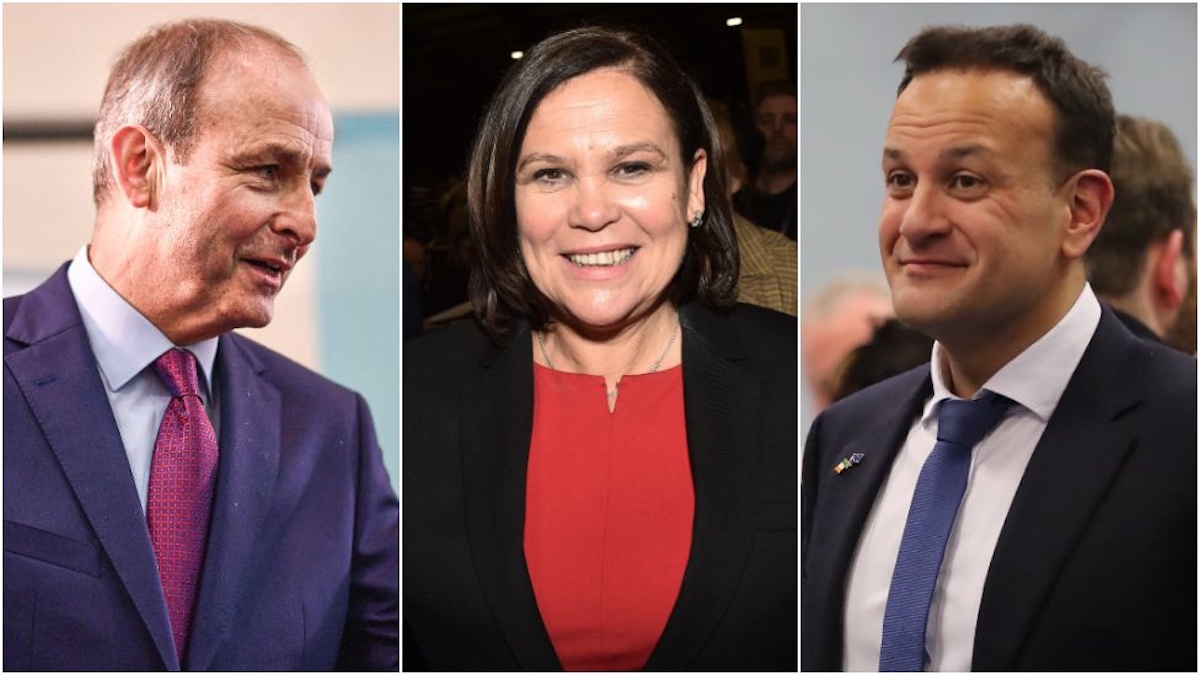
By Denzil McDaniel (for the Irish News)
“He would, wouldn’t he?” was the famous reply during the Profumo scandal in the 1960s by Mandy Rice-Davies when the showgirl was told her lover, Lord Astor denied their affair.
Often misquoted as, “He would say that, wouldn’t he?”, the line has proved useful in many situations since. I thought of it again when Tánaiste Micheál Martin launched a blistering attack on Sinn Féin, accusing them of “infecting a new generation of young people”.
There’s never been any love lost between the parties, but if you’re wondering why now for such strong invective, the fact that he was speaking during a ‘think-in’ by Fianna Fáil when the party distanced themselves from going into government with Sinn Féin will tell you all you need to know. An election is coming down the track.
The southern election will probably be next year, and government partners Fianna Fáil and Fine Gael are under serious pressure.
In a Sunday Independent/Ireland Thinks poll this month, Sinn Féin continue to be by far the largest single party at 33 per cent, predicted to win 67 Dáil seats. This is almost double Fianna Fáil on 18 per cent and away ahead of Fine Gael on 21 per cent.
So, you can see why Micheál Martin would want to damage Sinn Féin. But rather than work out why Sinn Féin are on the rise north and south, he takes refuge in an old trope, reinforced by the claim that the media are acting as “cheerleaders” in predicting a Sinn Féin government. Blaming the media for reflecting reality is never a good look.
Tactically, all this hasn’t worked in recent years, and it won’t work now.
In the process he manages to alienate a generation of younger voters. Across the island, we’re fortunate to have bright, articulate and visionary younger people with a modern outlook.
They’re voting for Sinn Féin in spite of the past, not because of it, and it’s insulting to them to suggest they’re being “infected” and don’t know what they’re doing.
Indeed, it’s not just the younger generation. I was involved in a project over the last year doing in-depth interviews with people along both sides of the border and from both communities.
There was a clear trend that people’s priorities are housing, health, and dealing with a series of social and economic issues moving forward.
One older Monaghan man said: “People are not just voting for Sinn Féin because they’re mad republicans. They’re voting for them because they’re disgusted with the way the two main parties have made political life in Ireland a privilege for the privileged.”
While the spat between the establishment parties and Sinn Féin will only intensify over the coming year, it is also particularly noticeable that the tone and mood is changing across nationalism towards the pace of possible constitutional change.
On becoming Taoiseach three years ago, Micheál Martin distanced himself from a border poll. But this week he felt he needed to restate his reunification credentials by stating his party was founded on the principles of Wolfe Tone of uniting Protestant, Catholic and dissenter.
Leo Varadkar now says that he expects a united Ireland in his lifetime and the SDLP leader, Colum Eastwood, supports a referendum on unity by 2030 if the conditions are right.
Political unionism is staying out of the debate about what a ‘new Ireland’ would look like; but there are clear signs that there is discussion among civic society. DUP grandee Wallace Thompson’s assertion that he would consider a new Ireland was, predictably, met with personal criticism.
But one of the most significant things he said was that people in unionist parties, the loyal orders and churches tell him privately that he’s right, but they can’t say it publicly.
Unionists should realise that a new Ireland isn’t exclusively a Sinn Féin project and could find allies in Micheál Martin and Leo Varadkar in a blue-sky debate which needn’t necessarily have a predetermined outcome. Varadkar stated again that he wants to accommodate the British identity.
This is a debate that needs structure, a Civic Assembly perhaps, and unionists will need to be persuaded to join.
Last week, Bernadette McAliskey said that she does not wish for a united Ireland in its current state, adding: “I have no more interest than the average unionist in being submerged into the Free State.”
Many northern republicans and nationalists say this and, not for the first time, Bernadette speaks for them. There’s an irony that she now speaks up for many unionists too.
![[Irish Republican News]](https://republican-news.org/graphics/title_gifs/rn.gif)
![[Irish Republican News]](https://republican-news.org/graphics/title_gifs/harp.gif)

